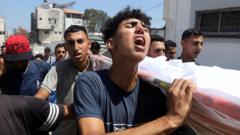Waning stability in Syria underscores the fragility among its diverse communities, with mounting violence drawing in external actors, particularly Israel.
**Escalating Violence in Syria's Druze Regions Sparks Alarm Over Continued Instability**

**Escalating Violence in Syria's Druze Regions Sparks Alarm Over Continued Instability**
Tensions rise as deadly clashes disrupt peace, prompting international intervention and deepening fears of systemic unrest in Syria.
The recent clashes in Syria's predominantly Druze areas near Damascus have ignited fears of an extended cycle of violence, emblematic of the lingering instability that continues to haunt the nation years after the upheaval of Bashar al-Assad's regime. The Druze community's spiritual leader has condemned the escalation, describing it as an "unjustifiable genocidal campaign," illustrating the gravity of the situation.
In the latest outbreak, violence erupted between Islamist factions, government forces, and Druze fighters, suggesting both internal strife and external influences are complicating the security landscape of Syria. Reports indicate that Israel conducted air strikes to safeguard Druze civilians, highlighting the complexities of intervening external parties in Syria's ongoing conflict.
Syria remains deeply fractured following over a decade of civil war. Areas like Idlib remain under the control of formation hybrids like Hayat Tahrir al-Sham, while Kurdish forces enjoy a degree of autonomy in the northeast. Similarly, the Druze community has exercised limited control, barely containing the threats from jihadist factions.
Recent violence south of Damascus, particularly in Ashrafiyat Sahnaya, led to the deaths of over 101 individuals, including a substantial number of Druze among the casualties. Syrian observatories noted that more than 60 Druze combatants and 10 civilians lost their lives in the conflict, signifying the severity and human cost of the unrest.
Currently, hostilities have reportedly eased following ceasefire agreements between the government and Druze leaders, yet the potentially incendiary origins—such as the circulation of inflammatory comments attributed to a Druze cleric—raise alarms about the ease with which conflict may reignite. Distrust persist among marginalized communities like the Druze and Alawites towards the newly established Islamist-led authorities, complicating efforts to forge unity.
Exploiting these vulnerabilities, Israel has seized additional territory in southern Syria, positioning itself as a protector of the Druze while facing criticism from the Syrian government over territorial sovereignty. Turkey's rising support for Syrian rebel factions adds another layer of tension, especially given its adverse views toward Israeli involvement, illustrating the complicated web of geopolitics that further destabilizes the region.
As Syria grapples with its fragmented state, external players' vested interests complicate already intricate sociopolitical dynamics. The pursuit of political stability and humanitarian support remains critical for a nation longing for stability after years of inner strife, underscoring the urgent need for cohesive international assistance to secure a safer future for its citizens.
In the latest outbreak, violence erupted between Islamist factions, government forces, and Druze fighters, suggesting both internal strife and external influences are complicating the security landscape of Syria. Reports indicate that Israel conducted air strikes to safeguard Druze civilians, highlighting the complexities of intervening external parties in Syria's ongoing conflict.
Syria remains deeply fractured following over a decade of civil war. Areas like Idlib remain under the control of formation hybrids like Hayat Tahrir al-Sham, while Kurdish forces enjoy a degree of autonomy in the northeast. Similarly, the Druze community has exercised limited control, barely containing the threats from jihadist factions.
Recent violence south of Damascus, particularly in Ashrafiyat Sahnaya, led to the deaths of over 101 individuals, including a substantial number of Druze among the casualties. Syrian observatories noted that more than 60 Druze combatants and 10 civilians lost their lives in the conflict, signifying the severity and human cost of the unrest.
Currently, hostilities have reportedly eased following ceasefire agreements between the government and Druze leaders, yet the potentially incendiary origins—such as the circulation of inflammatory comments attributed to a Druze cleric—raise alarms about the ease with which conflict may reignite. Distrust persist among marginalized communities like the Druze and Alawites towards the newly established Islamist-led authorities, complicating efforts to forge unity.
Exploiting these vulnerabilities, Israel has seized additional territory in southern Syria, positioning itself as a protector of the Druze while facing criticism from the Syrian government over territorial sovereignty. Turkey's rising support for Syrian rebel factions adds another layer of tension, especially given its adverse views toward Israeli involvement, illustrating the complicated web of geopolitics that further destabilizes the region.
As Syria grapples with its fragmented state, external players' vested interests complicate already intricate sociopolitical dynamics. The pursuit of political stability and humanitarian support remains critical for a nation longing for stability after years of inner strife, underscoring the urgent need for cohesive international assistance to secure a safer future for its citizens.





















